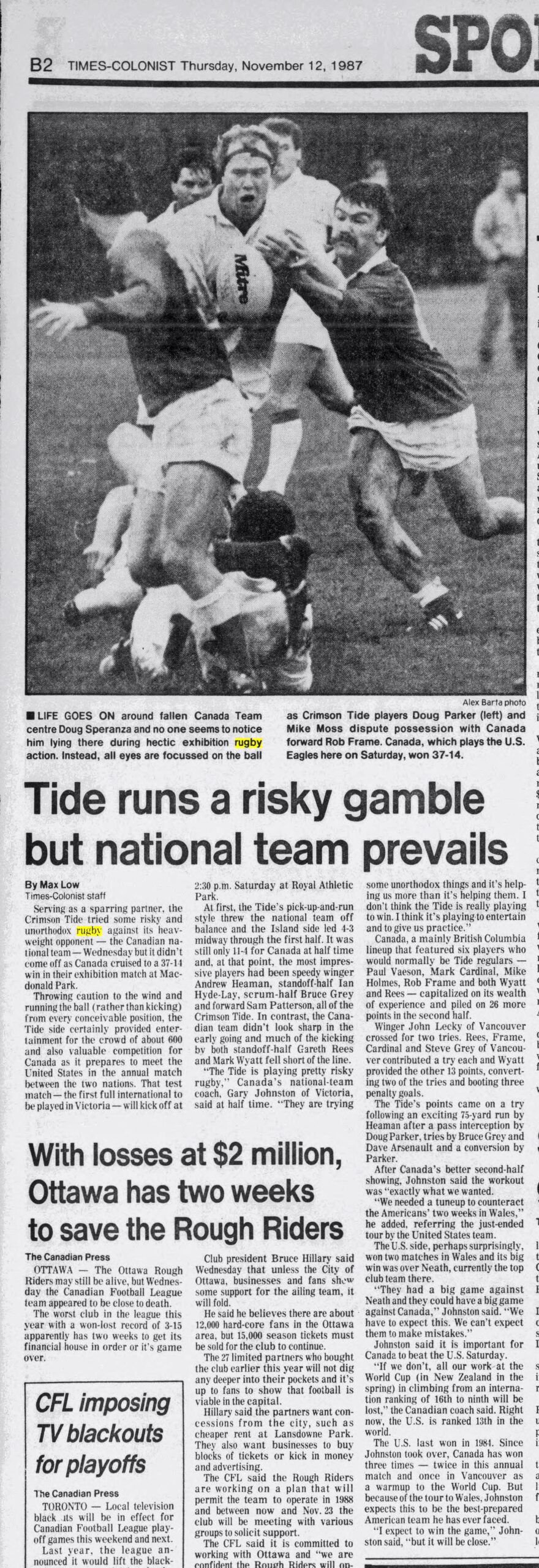A Look at Rugby on Remembrance Day in 1945-1947, 1987
The Armistice, an agreement to end the fighting of the First World War as a prelude to peace negotiations, began at 11am on 11 November 1918. That was the history behind Armistice or Remembrance Day. “At the eleventh hour on the eleventh day of the eleventh month – we will remember them”. We take a look at how rugby in Victoria was part of the Remembrance Day events in the years after World War II and as recent as 1987.
1945, November 11th, Sunday
The Second World War had just ended in September this year. Rugby was front and centre of the “Holiday Sports Program”. This year November 11th fell on a Sunday, a paper was published, but the rugby games were being held on Monday at MacDonald Park in Victoria the home of the Victoria Rugby Union. There were 3 rugby games planned, Naval College v JBAA and Oak Bay Wanderers vs Victoria College in the senior league and an intermediate league game Victoria College vs Naval Cadets.
1946, Sunday, November 10th
Remembrance Day fell on a Monday this year, there was no paper published, but the Sunday paper of November 10th laid out the rugby matches for Monday. They were still alternating between calling it Armistice Day and Remembrance Day. The headline match was JBAA v Vancouver Rowing Club, a battle of the rowing clubs as the paper noted. Again MacDonald Park was the venue. There was an Intermediate league (junior) game on the second field, Oak Bay Athletics vs Oak Bay High. A block ad was taken out in the newspaper and there was an admission fee to attend.
1947, Tuesday, November 11th
Remembrance Day fell on a Tuesday, there was a newspaper published, and a rugby game was a key part of the day’s events, again at MacDonald Park. JBAA vs Canadian Scottish would be the match and the Lieutenant Governor of British Columbia, Charles Arthur Banks, would open the match as he was piped onto the field by the Canadian Scottish Regimental band. Wallace, the St. Bernard mascot, would also be present. The brass band of the Highlanders would also be in attendance. Entrance fee was 25 cents for adults and 10 cents for children, proceeds to go towards the Injured Players’ Fund. An interesting side note, Lieutenant Governor Charles Arthur Banks was born in NZ and after earning his engineering degree moved to Canada and served during World War I in the Royal Engineers.
November 11th 1987
When did the practice of playing rugby on Remembrance Day end in BC, we’re still doing research on that but in 1987 the Tide played Canada on Wednesday November 11th at MacDonald Park. Canada were preparing for their game against the USA on Saturday at Royal Athletic Park, November 14th. Canada would go on to win that match against USA 20-12. In the warm up game against the Tide on November 11th, Canada won 37-14. Tide players on the Canada side included Gareth Rees, Mark Wyatt, Mark Cardinal, Mike Holmes, Paul Vaeson, Rob Frame. At the time Canada were ranked 9th in the world, the USA 13th.






